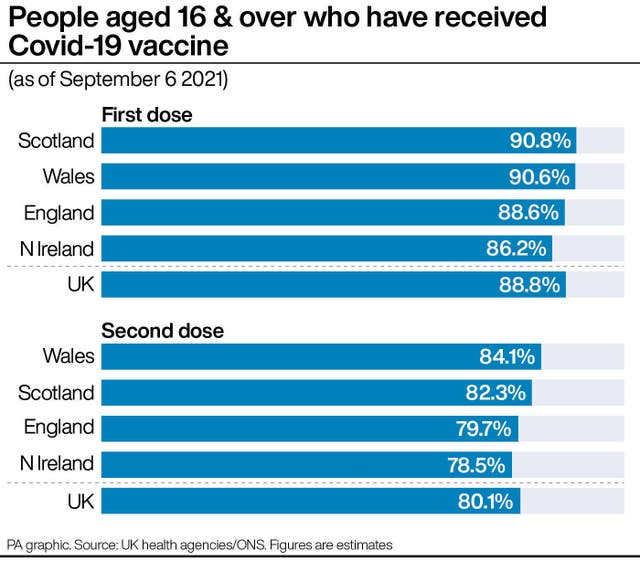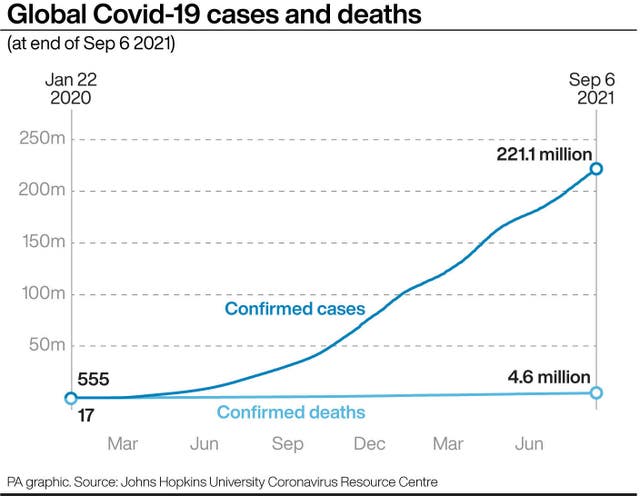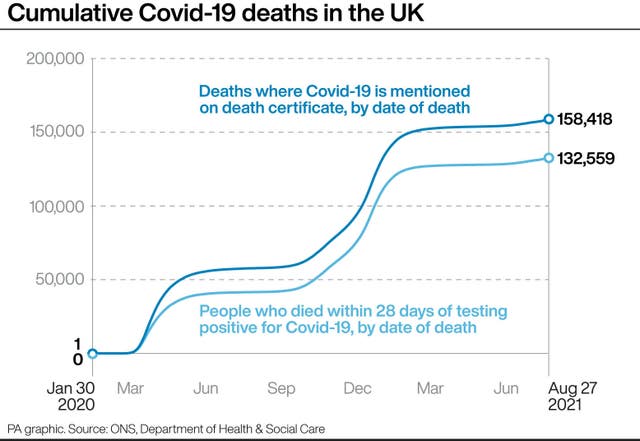No half-term firebreak but ‘last resort’ plans remain in place, says Government
Vaccines minister Nadhim Zahawi said he hoped the virus can be dealt with in future without having to take the ‘severe measures’ seen previously.

A so-called firebreak lockdown in England is not being planned for October half-term, but there are contingency plans that would “only be reintroduced as a last resort” to protect the NHS, the Government has said.
The Prime Minister’s official spokesman said the vaccination programme provides “significant defences” which the country did not have on previous occasions when restrictions were put in place.
Downing Street denied there is a plan to put in place a firebreak this autumn if there is a new surge in Covid-19 cases, but the Government said there are “contingency plans” for a “range of scenarios”.
The comments come after the i newspaper reported an unnamed member of the Scientific Advisory Group for Emergencies (Sage) saying a “precautionary break” could be part of “contingency plans”.
The paper quoted another unnamed source saying that “a firebreak lockdown is by no means out of the question”, and it was reported that could mean a two-week school half-term instead of one week.
Asked about the report, the No 10 spokesman said: “It is not true that the Government is planning a lockdown or firebreak around the October half-term.”
He added: “We have retained contingency plans as part of responsible planning for a range of scenarios, but these kind of measures would only be reintroduced as a last resort to prevent unsustainable pressure on our NHS.

“I think we’ve been clear throughout that we will take action, and indeed we have done when necessary to protect our NHS.
“But under the previous occasions when that action has been required, we have been without the significant defences that our vaccination programme provides us – we’re now in a much different phase.”
It comes after vaccines minister Nadhim Zahawi said he had not seen any plans around a firebreak and added that he hopes the virus can be dealt with “year in, year out” without having to take the “severe measures” seen last December.
He told BBC Breakfast: “Vaccines have given us the ability to reduce infections, to save 100,000 lives.
“It is through the booster programme that I hope … we can transition the virus from pandemic to endemic status and deal with it year in, year out.

“It is going to be with us for many years – but not have to close down our economy or take the severe measures we had to sadly take in December of last year.”
The number of deaths involving coronavirus registered each week in England and Wales has climbed to the highest level for five months.
A total of 668 deaths registered in the week ending August 27 mentioned Covid-19 on the death certificate, according to the Office for National Statistics (ONS) – the highest number since 719 deaths were registered in the week to March 26.
The latest figures show the impact of the third wave of Covid-19, which began in the UK in May, but the number of deaths is still well below the level seen at the peak of the second wave – reflecting the success of the rollout of coronavirus vaccines across the country.
Health Secretary Sajid Javid hailed new figures on Tuesday showing four in five adults across the UK have been fully vaccinated against coronavirus as a “phenomenal achievement”.
Meanwhile, leading academic said it was “concerning” that some people feel they are no longer at risk so have stopped taking steps to protect others.
Professor Robin Shattock, head of mucosal infection and immunity at Imperial College London, told Times Radio that the need to wear masks in crowded spaces and public transport was “still very relevant” and urged continued caution.
Prof Shattock, who leads the Imperial vaccine programme, said that next winter elderly people and the vulnerable may be given an updated booster vaccine.
The Joint Committee on Vaccination and Immunisation (JCVI) is preparing to make a decision on booster jabs for the winter, with no announcement made yet.
On whether or not vaccines need to be tweaked, Prof Shattock said the Delta variant will be observed to see if it “remains stable and globally dominant”.
“If it does, then I think people will look to update the vaccine over time,” he said.

“In the short term, we already know that the vaccines are effective at preventing serious illness from the Delta variant so there isn’t a pressing need to rush quickly, although this can be done in a relatively short order, probably a period of six months.”
He added: “I would imagine that as we come round to the winter of next year we will be looking to boost at least the elderly and vulnerable populations, most likely with an updated vaccine.”
The UK’s chief medical officers are currently reviewing the wider benefits of vaccinating 12 to 15-year-olds, such as minimising school absences, after the JCVI declined to recommend a widespread rollout to the age group on health grounds alone.
Schools minister Nick Gibb has said consent from parents of healthy 12 to 15-year-olds will “be sought” if Covid-19 vaccinations are approved for their children.
Speaking to the Education Select Committee on Tuesday, he acknowledged that in some “rare” circumstances, like in previous vaccination programmes, teenagers can consent themselves, adding: “The people administering vaccines in schools are aware of these sensitive issues.”





